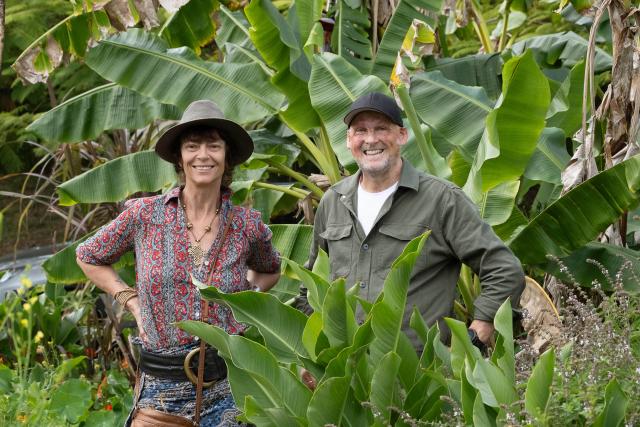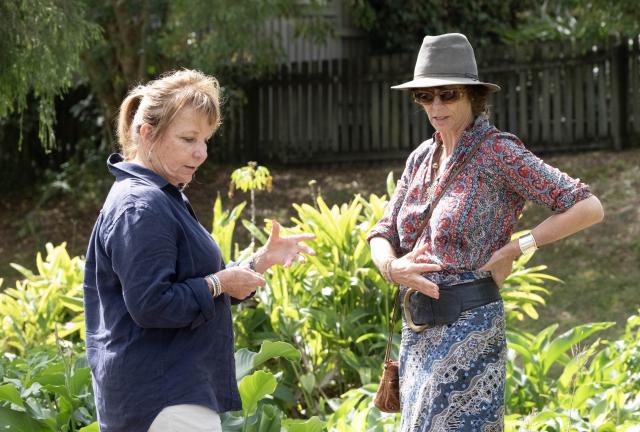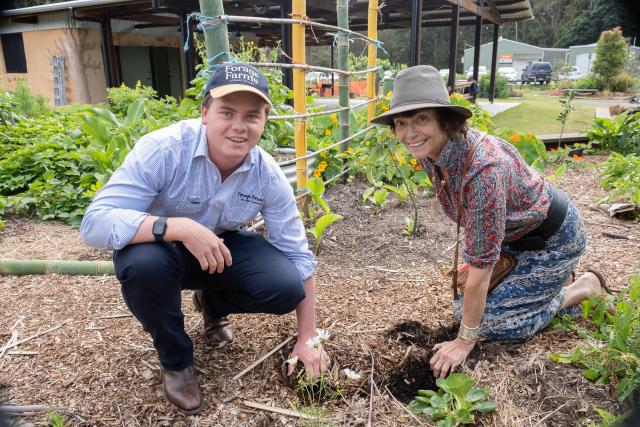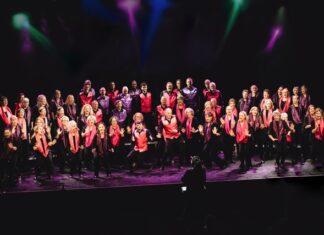Film director and actor Rachel Ward has “no illusions“ that her film, Rachel’s Farm, which tells her journey to regenerative farming, will change the world, but views it as a way of adding to the increasing number of voices looking for an alternative to conventional farming and its contribution to climate change.
“It doesn’t make me feel more hopeful about climate change, the tiny weeny bit that I’m doing,“ she said.
“It makes me feel that I am matching my concern with what I can do. Before I went for a march or two, recycled, wrote to my local representative. It just felt so small.
“This made me feel like I was making a much bigger contribution to changing things. A lot of people feel the same. They don’t feel what they’re doing is big enough to match what I believe is of great concern because it will change everything.“
Last week Slow Food Noosa in conjunction with Noosa District Landcare, Tarwyn Park Training and Kandanga Farm Store brought screenings of Rachel’s Farm to the region followed by panel discussions featuring the actor/director who also visited Permaculture Noosa at Cooroy during the week.
Slow Food Noosa and Noosa and District Land Care have offered farmers a Regenerative Farming and Rewilding Grant for the past two years.
Slow Food Noosa committee member Rod Lees said the organisation thought Rachel’s movie on regenerative farming would provide “a great opportunity to not only educate ourselves but the community on positive benefits of regenerative farming“ and give Slow Food Noosa ideas on where to direct future funding that would be positive for regenerative farming.
In the film Rachel “voyages from her own wilful ignorance about the ecological impacts of conventional agriculture, to championing a movement to restore the health of our farmland, food and climate and in doing so the wellbeing of the farming communities that sustain the nation, and its people“.
Rachel and husband Bryan Brown have a farm in the Nambucca Valley, in the Mid North Coast of NSW where they have raised cattle and their three children, endured droughts, and flooding rains and, finally, the catastrophic bush fires of 2019-20, which threatened their farm and devastated the country.
Neighbouring farmer and farm manager Mick Green shared Rachel’s view that conventional farming was no longer working, and together they discovered that neither of their farms were ecologically or financially viable.
Having switched to regenerative farming she now feels more connected to the land she is working and sees the changes that come from working with nature.
“We have to get back to farming much more with nature. Regenerative farming is about restoring the natural cycles of nature,“ she said.
“Our health is going in the same direction as our poor farming habits and we’ve just been using too much pesticides, too much herbicides, too much chemical fertiliser, too much nitrogen dense applications which is destroying our waterways, destroying our oceans, decimating our landscapes.“
Rachel believes it’s up to everyone as consumers to force changes in farming.
“If you want to change the paradigm or the way we’re farming the way we’re eating, the consumers have the power,“ she said. “If you look for food from best practice farms you’re going to be healthier but also the land will be healthier and the animals.
“With my film I didn’t want to speak to the bubble. I didn’t want to speak to the farmers. I can’t change the farmers. I’m speaking to the consumers because it’s only the consumers who will change the retailers and the retailers will change the farmers.“
Noosa councillor Tom Wegener has identified the key messages of Rachel’s Farm being clearly identified in the Noosa Council’s plans and strategies. The New Corporate Plan 2023-2028, the primary strategic document of Noosa Council, states: ’(council will) work with agricultural organisations and agencies to support and educate landholders on regenerative agriculture methods and promote local and sustainable food production,’ he said. The Noosa Environment Strategy 2019 has a target: “By 2030, 80 per cent of all grazing land achieves best practice management for agriculture“.
The Climate Change Response Plan 2021 clearly states Noosa Council’s vision: “Changes in climate conditions require constant adapting to remain productive and viable. Early adoption of climate-smart agricultural practices will put enterprises in the best position to deal with climate risks and extreme weather. This includes increasing the organic matter in soils to increase the carbon taken up in the soils. This has added benefits of higher fertility levels, better water retention and prolonged resistance to drought“. Cr Wegener added that regenerative agriculture practices would help heal the Noosa River by reducing silt and chemicals entering the waterways.
“Noosa Council is committed to regenerative agriculture and this commitment is shared with numerous groups including Noosa Landcare, the Food and Agribusiness Network, Tourism Noosa, the MRCCC, NBRF, Slow Food Noosa, Country Noosa, and Permaculture Noosa,“ he said.
“We all have to work together to realise a healthier future. At the August Business Round Table meeting at Noosa Council, this vision progressed with the group’s plan to, “Scope the preparation of a Food and Agribusiness Industry Development Plan,“ and “Scope and prepare a pre-feasibility for a Food and Agri Business HUB.“ Rachel, we are with you.“
Noosa chef Matt Golinski has long espoused the need to connect local produce with the food we eat.
“Broad acre farming is never going to feed the entire population. But starting that education, what food is, what’s involved in growing it, why it’s important growing it locally – people are starting to get interested,“ he said.
“It’s the only thing that makes sense to me these days.
“I’ve always had that connection to food and where it comes from. That’s what makes it so special – to have that story behind it.
“If I’m cooking for 100 people they’ll eat it and go it’s delicious. If I tell them the story that’s it taken to get to that point they’ll remember that. They may not remember the fish dish but they’ll remember the story I told them about the guy who caught the fish. That makes it special.
“You go to the farmers market, it’s a bit expensive and you might think it’s no better than going to the supermarket. It’s not true if you think about what you’re getting. It’s fresher, lasts longer, more nutrient rich – all those things come in to it.
“From my point of view it makes me feel good using it, it’s like that energy and love that goes into growing that food carries on in the energy and love that goes into cooking it – it supercharges the end product.“
Rachel’s farm website has anything you want to know about regenerative farming and her journey to it.
It also has an incredible map linking to all regeneratively growing food and farms and organic farms, farms grown by women and indigenous foods. “Anyone who has a farm grown best practice should get on the map,“ Rachel said.
“Get on the map we need to circumvent the main food chain and get this healthy food out there.“











